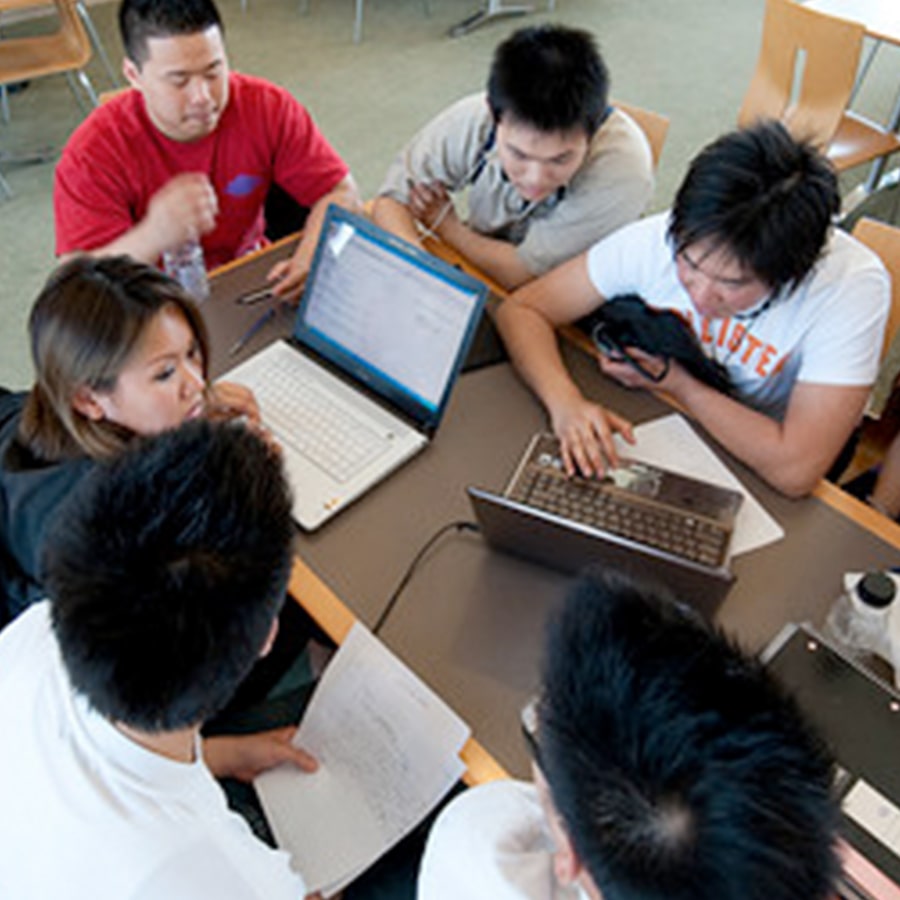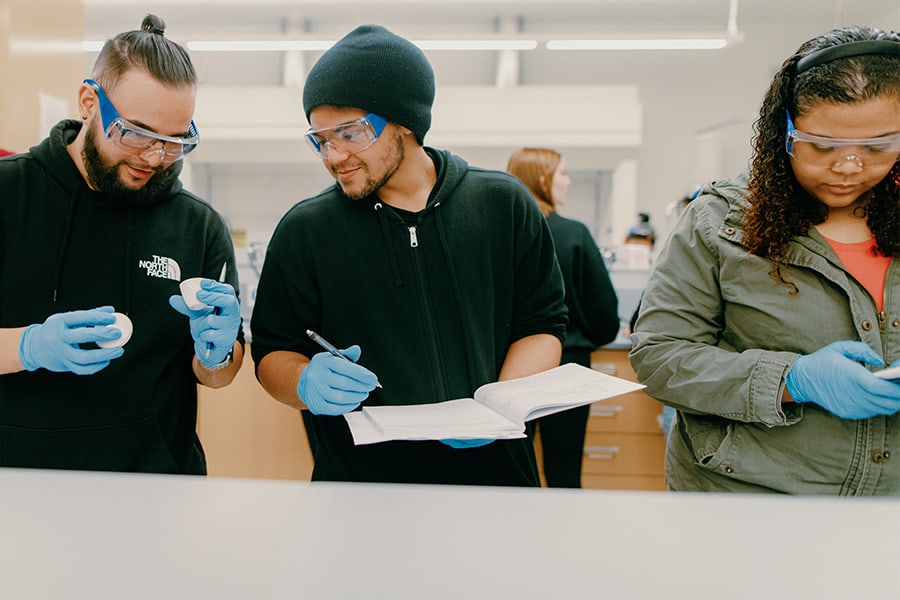Plan Your Education
How to Apply
Apply for Admission
Please review the first-year and transfer apply pages for important information about application requirements, deadlines, and application status check.
Financing Your Education
Become a Beacon and pursue your passion in UMass Boston’s diverse, supportive environment. Many students across our 200+ undergraduate and graduate programs receive financial aid—providing access to an education that’s exceptional and affordable. Click below to learn more about financial aid opportunities and deadlines.
Financial Aid Deadlines & Application Process
Scholarships for First-Year & Transfer Students
Curriculum
Major Requirements
Complete a minimum of 73 credits from 23 courses including thirteen required computer science courses, four mathematics courses, four physics courses, and two computer science electives.
GPA: A minimum GPA of 2.0 is required for all major courses.
Pass/fail: No courses applied toward the major may be taken pass/fail.
Residency: At least six courses for the major at the 300-level or higher must be completed at UMass Boston.
Required Computer Science Courses (44 Credits)
- CS 110 - Introduction to Computing 4 Credit(s)
- CS 210 - Intermediate Computing with Data Structures 4 Credit(s)
- CS 220 - Applied Discrete Mathematics 3 Credit(s)
- CS 240 - Programming in C 3 Credit(s)
- CS 285L - Social Issues and Ethics in Computing 3 Credit(s)
- CS 310 - Advanced Data Structures and Algorithms 3 Credit(s)
- CS 341 - Computer Architecture and Organization 3 Credit(s)
- CS 410 - An Introduction to Software Engineering 3 Credit(s) (this will be the capstone course for the major)
- CS 420 - An Introduction to the Theory of Computation 3 Credit(s)
- CS 444 - An Introduction to Operating Systems 3 Credit(s)
- CS 446 - Introduction to Internetworking 3 Credit(s)
- CS 449 - Introduction to Computer Security 3 Credit(s)
- CS 451 - Compilers 3 Credit(s)
Mathematics Courses (14 Credits)
- MATH 140 - Calculus I 4 Credit(s)
- MATH 141 - Calculus II 4 Credit(s)
- MATH 260 - Linear Algebra I 3 Credit(s)
- MATH 345 - Probability and Statistics 3 Credit(s)
Physics Courses (12 Credits)
- PHYSIC 113 - Fundamentals of Physics I 4 Credit(s)
- PHYSIC 114 - Fundamentals of Physics II 4 Credit(s)
- PHYSIC 181 - Physics Laboratory I 2 Credit(s)
- PHYSIC 182 - Physics Laboratory II 2 Credit(s)
Computer Science Electives (6 Credits)
Take two courses from below. With prior permission, it may be possible to take an independent study course.
- CS 413 - Applied Cryptography 3 Credit(s)
- CS 430 - Database Management 3 Credit(s)
- CS 436 - Database Application Development 3 Credit(s)
- CS 437 - Database-Backed Web Sites & Web Services 3 Credit(s)
- CS 438 - Applied Machine Learning 3 Credit(s)
- CS 442 - Cybersecurity in the Internet of Things 3 Credit(s)
- CS 443 - Mobile Applications 3 Credit(s)
- CS 450 - The Structure of Higher Level Languages 3 Credit(s)
- CS 460 - Graphics 3 Credit(s)
- CS 461 - Computer Games Programming 3 Credit(s)
- CS 470 - An Introduction to Artificial Intelligence 3 Credit(s)
-
The following graduate level courses can also be used, but require departmental approval. Descriptions can be found in the Graduate Catalog.
- CS 615
- CS 620
- CS 622
- CS 624
- CS 630
- CS 632
- CS 634
- CS 636
- CS 637
- CS 639
- CS 641
- CS 644
- CS 646
- CS 647
- CS 648
- CS 662
- CS 664
- CS 670
- CS 672
- CS 674
- CS 675
- CS 680
Deadlines and Cost
Early action deadline: November 1; Regular Decision Deadline: June 15
Financing Your Education
Become a Beacon and pursue your passion in UMass Boston’s diverse, supportive environment. Many students across our 200+ undergraduate and graduate programs receive financial aid—providing access to an education that’s exceptional and affordable. Click below to learn more about financial aid opportunities and deadlines.
Financial Aid Deadlines & Application Process
Scholarships for First-Year & Transfer Students
For additional information regarding tuition and fees, please visit the Bursar’s Office or send an email to Bursar@umb.edu.
Contact
Department of Computer Science
University of Massachusetts Boston
100 Morrissey Boulevard
Boston, MA 02125
Phone: 617.287.6441
Email: csinfo "at" umb.edu
Administrative Office
McCormack Building, 3rd Floor, Room 0201
UNIX Lab
UNIX Lab
Location: McCormack Building, 3rd Floor, Room 731
Phone: 617.287.6480
Department Chair
Marc Pomplun
Office: McCormack Building, 3rd Floor, Room 0201-09
Phone: 617.287.6443
Email: marc.pomplun@umb.edu
Undergraduate Program Director of Computer Science
Nurit Haspel
Office: McCormack Building, 3rd Floor, Room 0201-04
Phone: 617.287.6414
Email: nurit.haspel@umb.edu
Undergraduate Program Advisor of Information Technology
Glenn Hoffman
Office: McCormack Building, 3rd Floor, Room 0201-22
Phone: 617.287.4700
Email: glenn.hoffman@umb.edu
Graduate Program Director
Dan Simovici
Office: McCormack Building, 3rd Floor, Room 0201-05
Phone: 617.287.6472
Email: dan.simovici@umb.edu
Seminar Coordinator
Tiago Cogumbreiro
Office: McCormack Building, 3rd Floor, Room 0201-16
Phone: 617.287.6479
Email: tiago.cogumbreiro@umb.edu
Jobs and Internships Coordinator
Elizabeth O'Neil
Office: McCormack Building, 3rd Floor, Room 0201-20
Phone: 617.287.6455
Email: elizabeth.oneil@umb.edu
Administrative Assistant
Debbie Wade
Office: McCormack Building, 3rd Floor, Room 0201
Phone: 617.287.6476
Email: debbie.wade@umb.edu
Graduate Program Secretary
Gemma Galecia
Office: McCormack Building, 3rd Floor, Room 0201
Phone: 617.287.6441
Email: gemma.galecia@umb.edu

Computer Science
Learn more about UMass Boston's Computer Science department, our research, and our faculty.
Explore the Department of Computer Science
College of Science & Mathematics
Learn more about the faculty, research, and programs that make up our College of Science and Mathematics.
Explore Now
